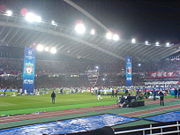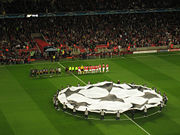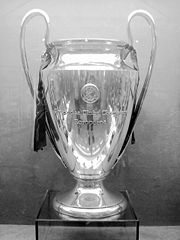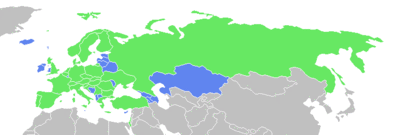UEFA Champions League
2008/9 Schools Wikipedia Selection. Related subjects: Sports events
|
UEFA Champions League |
|
|---|---|
 |
|
| Founded | 1955 |
| Region | Europe ( UEFA) |
| Number of teams | 32 (group stage) 76 or 77(total) |
| Current champions | |
| Most successful club | |
| Television broadcasters | List of broadcasters |
| Motto | Champions League Hymn |
The UEFA Champions League is a seasonal club football competition organised by one of the Union of European Football Associations (UEFA) since 1955 for the most successful football clubs in Europe. The prize, the European Champion Clubs' Cup, is considered the most prestigious club trophy in the sport.
The UEFA Champions League is separate from the less prestigious UEFA Cup and the defunct Cup Winners' Cup.
The tournament consists of several stages. In the present format it begins in mid-July with three preliminary knockout qualifying rounds. The 16 surviving teams join 16 seeded teams in a group stage. Eight group winners and eight runners-up enter the final knockout rounds, which end with the final match in May.
The current holders of the UEFA Champions League trophy are AC Milan, who beat Liverpool FC 2-1 at the Olympic Stadium in Athens, Greece on 23 May 2007.
Moscow will host its first European Cup final for the 2007-08 season.
History

The tournament was inaugurated in 1955, at the suggestion of the French sports journalist and editor of L'Équipe Gabriel Hanot, as a continental competition for winners of the European national football leagues, as the European Champion Clubs' Cup, abbreviated to European Cup.
The competition began in 1955/56 using a two-leg knockout format where the teams would play two matches, one at home and one away, and the team with the highest overall score qualifying for the next round of the competition. Entry was restricted to the teams that won their national league championships, plus the current European Cup holder. This qualification system continued until 1992. In the 1992–93 season, the tournament was renamed to UEFA Champions League and in 1997/98, eligibility was expanded to include not just domestic champions but also the best performing runners up according to UEFA's coefficient ranking list. In UEFA's coefficient system, a team finishing second in the Spanish La Liga would be more deserving of an automatic place in the Champions League than a team finishing first in, for example, Polish Orange Ekstraklasa. As a result, the system was restructured to force "weaker" national champions to qualify for the group stages, while other, "stronger" national runners-up would automatically get places.
Between 1960 and 2004 the winner of the tournament qualified for the now defunct Intercontinental Cup (against the winner of the Copa Libertadores of South America). Since then, with FIFA taking over, the winner automatically qualifies for the FIFA Club World Cup with other winners of continental club championships.
Qualification
The UEFA Champions league is open to the league champions of all UEFA member associations (except Liechtenstein, which has no league competition), as well as to the clubs finishing from second to fourth position in the strongest leagues. Since January 2007 the two lowest-ranked league competitions (currently the Andorra and San Marino leagues) can also represent their domestic champions in the Champions League.
The number of places in the competition depends on the association's rank in the UEFA coefficients table:
- associations ranked 1 to 3 have four positions,
- associations ranked 4 to 6 have three positions,
- associations ranked 7 to 15 have two positions,
- associations ranked 16 or lower have one position.
An association's rank also determines the stage at which the clubs enter the competition. For example, the three highest-ranked associations have two places in the group stage (for champions and runners-up) and two in the third qualifying round (for third and fourth-placed teams), whereas the lowest-ranked associations have only one place in the first qualifying round for their champions. Nine highest-ranked associations have at least one automatic place in the group stage.
An additional place in the group stage is reserved for the title-holders, in case they don't qualify via their domestic league. However, an association is limited to sending at most four clubs for a season. This means that if the title-holders come from a league given four positions, but finish out of the top four, it will take the place of the fourth placed team. The fourth placed team will go to the UEFA Cup. The similar rule is applied for leagues given two or three positions (then second/third placed team is transferred to the UEFA Cup), but not for associations entitled to only one position - champion always takes a part! That's why total number of teams is not fixed. However this is not always the case as seen in 2005. Liverpool won the Champions League in dramatic fashion in Istanbul however domestically finished in 5th position and just outside the final Champions league spot whom bitter rivals Everton occupied. UEFA though granted permission for Everton to take part in the Champions League and join in the third round of qualifying. Liverpool were also granted permission to take part in the competition however had to start from the first round of qualifying.
At meeting in Lucerne, 30th of November 2007, UEFA decided to indroduce new qualification system for period 2009-2012 which will give automatic qualifying berth to the group stage for 22 teams instead 16 (6 new entrants: 3-rd placed teams from associations 1-3 + champions from associations 10-12). Remaining 10 teams will be given through a double qualification path: one reserved for the champions of the associations ranked 13 or lower, and one reserved for non-champions of associations ranked 1-15. Both paths will be held independently to each other and each will be given by 5 winners - last participants in group stage. The main idea was to enable champions coming from low-ranked associations much easier access to the main tournament through their head-to-head matches than through matches against non-champions from high-ranked associations which failed to qualify directly for group stage through their domestic league.
In addition to sporting criteria, any club must be licensed by its national association to participate in the Champions league. To obtain a license, club must meet certain stadium, infrastructure and finance requirements.
There was controversy when Liverpool won the competition in 2004/2005, but finished outside the top four in the Premiership. The Football Association ruled that Everton F.C. (who finished fourth) would get the final spot. However, UEFA came to an agreement that both Merseyside rivals would be allowed to enter the competition with Liverpool starting from the first qualifying round and Everton starting from the third qualifying round. Liverpool became the first team to negotiate all three rounds of qualification and reach the Champions League group phase, a feat matched by Artmedia Bratislava of Slovakia in the same season.
FC Barcelona, Manchester United and FC Porto are the teams that have appeared most often in the group stages: thirteen each. However, each has won the Champions League only once since the group stage was established.
The stages
The tournament consists of several stages and begins with three preliminary knockout qualifying rounds. Different teams start in different rounds, according to their position in domestic league and the UEFA coefficients of their league, while the sixteen top ranked teams spread across the biggest domestic leagues qualify directly.
In the subsequent preliminary round, participating teams are paired, with aggregate winners proceeding into the next round. Qualifying rounds span from mid-July to late August. The losers of the third qualifying round are transferred to the UEFA Cup, while the sixteen winners of the final qualifying round are joined by the sixteen teams who have qualified directly, to participate in the group stage.
Teams are drawn into eight groups of four teams, each team playing every other team in the group twice (home and away). The group stage is played between mid-September and early December. The teams finishing third in their groups are transferred to the UEFA Cup, while the top two teams from every group qualify for the next round. Here the sixteen remaining teams take part in the knock-out stage, which starts in late February and ends with the final match in May.
All qualifying rounds and knock-out ties are two-legged, with each team hosting one match. The team which scores the greater aggregate number of goals qualifies for the next round. The away goals rule applies. Extra time and penalty kicks are used to determine the winner, if necessary. An exception is the final, which is a single match played at a predetermined venue.
The draws are currently structured to ensure that clubs representing the same national association cannot play each other until the quarter-finals. This rule however was lifted for Liverpool's entry in 2006, as England had 5 representatives in the competition. As a result Liverpool were drawn against Chelsea in the group stages. In addition, seeding of the teams according to their UEFA coefficients is used. The competition system has been undergoing changes since the 1991-92 season (see history). The current system was adopted in 2003.
Champions League finals
The Champions League final is the most important match of the season in European club football. The stadium to host the final is selected by UEFA two years before the match.
| Season | Winner | Score | Runner-up | Venue |
|---|---|---|---|---|
| 1955–56 Final |
Real Madrid C.F. |
4–3 | Parc des Princes, Paris |
|
| 1956–57 Final |
Real Madrid C.F. |
2–0 | Santiago Bernabéu, Madrid |
|
| 1957–58 Final |
Real Madrid C.F. |
3–2 a.e.t. | Heysel Stadium, Brussels |
|
| 1958–59 Final |
Real Madrid C.F. |
2–0 | Neckarstadion, Stuttgart |
|
| 1958–59 Final |
Real Madrid C.F. |
7–3 | Hampden Park, Glasgow |
|
| 1960–61 Final |
S.L. Benfica |
3–2 | Wankdorf Stadium, Berne |
|
| 1961–62 Final |
S.L. Benfica |
5–3 | Olympisch Stadion, Amsterdam |
|
| 1962–63 Final |
A.C. Milan |
2–1 | Wembley Stadium, London |
|
| 1963–64 Final |
F.C. Internazionale Milano |
3–1 | Prater Stadium, Vienna |
|
| 1964–65 Final |
F.C. Internazionale Milano |
1–0 | San Siro, Milan |
|
| 1965–66 Final |
Real Madrid C.F. |
2–1 | Heysel Stadium, Brussels |
|
| 1966–67 Final |
Celtic F.C. |
2–1 | Estádio Nacional, Oeiras |
|
| 1967–68 Final |
Manchester United F.C. |
4–1 a.e.t. | Wembley Stadium, London |
|
| 1968–69 Final |
A.C. Milan |
4–1 | Santiago Bernabéu, Madrid |
|
| 1969–70 Final |
Feyenoord |
2–1 a.e.t. | San Siro, Milan |
|
| 1970–71 Final |
AFC Ajax |
2–0 | Wembley Stadium, London |
|
| 1971–72 Final |
AFC Ajax |
2–0 | De Kuip, Rotterdam |
|
| 1972–73 Final |
AFC Ajax |
1–0 | Red Star Stadium, Belgrade |
|
| 1973–74 Final |
FC Bayern Munich |
1–1 a.e.t., 4 – 0 replay |
Heysel Stadium, Brussels |
|
| 1974–75 Final |
FC Bayern Munich |
2–0 | Parc des Princes, Paris |
|
| 1975–76 Final |
FC Bayern Munich |
1–0 | Hampden Park, Glasgow |
|
| 1976–77 Final |
Liverpool F.C. |
3–1 | Stadio Olimpico, Rome |
|
| 1977–78 Final |
Liverpool F.C. |
1–0 | Wembley Stadium, London |
|
| 1978–79 Final |
Nottingham Forest F.C. |
1–0 | Olympic Stadium, Munich |
|
| 1979–80 Final |
Nottingham Forest F.C. |
1–0 | Santiago Bernabéu, Madrid |
|
| 1980–81 Final |
Liverpool F.C. |
1–0 | Parc des Princes, Paris |
|
| 1981–82 Final |
Aston Villa F.C. |
1–0 | De Kuip, Rotterdam |
|
| 1982–83 Final |
Hamburger SV |
1–0 | Olympic Stadium Spiros Louis, Athens |
|
| 1983–84 Final |
Liverpool F.C. |
1–1 a.e.t., 4–2 pen. |
Stadio Olimpico, Rome |
|
| 1984–85 Final |
Juventus F.C. |
1–0 (see: Heysel Stadium Disaster) |
Heysel Stadium, Brussels |
|
| 1985–86 Final |
FC Steaua Bucureşti |
0–0 a.e.t., 2–0 pen. |
Sánchez Pizjuán, Seville |
|
| 1986–87 Final |
F.C. Porto |
2–1 | Prater Stadium, Vienna |
|
| 1987–88 Final |
PSV Eindhoven |
0–0 a.e.t., 6–5 pen. |
Neckarstadion, Stuttgart |
|
| 1988–89 Final |
A.C. Milan |
4–0 | Camp Nou, Barcelona |
|
| 1989–90 Final |
A.C. Milan |
1–0 | Prater Stadium, Vienna |
|
| 1990–91 Final |
Red Star Belgrade |
0–0 a.e.t., 5–3 pen. |
Stadio San Nicola, Bari |
|
| 1991–92 Final |
FC Barcelona |
1–0 a.e.t. | Wembley Stadium, London |
|
| 1992–93 Final |
Olympique de Marseille |
1–0 | Olympic Stadium, Munich |
|
| 1993–94 Final |
A.C. Milan |
4–0 | Olympic Stadium Spiros Louis, Athens |
|
| 1994–95 Final |
AFC Ajax |
1–0 | Ernst Happel Stadium, Vienna |
|
| 1995–96 Final |
Juventus F.C. |
1–1 a.e.t., 4–2 pen. |
Stadio Olimpico, Rome |
|
| 1996–97 Final |
Borussia Dortmund |
3–1 | Olympic Stadium, Munich |
|
| 1997–98 Final |
Real Madrid C.F. |
1–0 | Amsterdam ArenA, Amsterdam |
|
| 1998–99 Final |
Manchester United F.C. |
2–1 | Camp Nou, Barcelona |
|
| 1999–00 Final |
Real Madrid C.F. |
3–0 | Stade de France, Paris |
|
| 2000–01 Final |
FC Bayern Munich |
1–1 a.e.t., 5–4 pen. |
San Siro, Milan |
|
| 2001–02 Final |
Real Madrid C.F. |
2–1 | Hampden Park, Glasgow |
|
| 2002–03 Final |
A.C. Milan |
0–0 a.e.t., 3–2 pen. |
Old Trafford, Manchester |
|
| 2003–04 Final |
F.C. Porto |
3–0 | Arena AufSchalke, Gelsenkirchen |
|
| 2004–05 Final |
Liverpool F.C. |
3–3 a.e.t., 3–2 pen. |
Atatürk Olympic Stadium, Istanbul |
|
| 2005–06 Final |
FC Barcelona |
2–1 | Stade de France, Paris |
|
| 2006–07 Final |
AC Milan |
2–1 | Olympic Stadium, Athens |
|
| 2007–08 Final |
Manchester United F.C. |
1–1 a.e.t., 6–5 pen. |
Luzhniki Stadium, Moscow |
|
| 2008–09 Final |
To be played | Stadio Olimpico, Rome |
||
| 2009–10 Final |
To be played | Santiago Bernabéu, Madrid |
The winning club gets possession of the trophy at the awards ceremony, but must return it to UEFA headquarters two months before the following year's final. UEFA gives the winners a scaled-down replica of the trophy to keep permanently, and winning clubs are free to make replicas of the trophy as long as they are clearly marked as replicas and are no larger than 80% of the size of the actual trophy. However, the current competition rules also specify that the actual trophy will be permanently awarded to a team that wins three consecutive years or five times in all.
Five clubs have been awarded the UEFA badge of honour and the right to keep the trophy permanently:
- Real Madrid, who won the first five competitions from 1956 to 1960, and again in 1966, 1998, 2000 and 2002.
- Ajax, who won consecutively in 1971–1973, and again in 1995.
- Bayern Munich, who won consecutively in 1974–1976, and again in 2001.
- AC Milan, who won for the fifth time in 1994, and again in 2003 and 2007 .
- Liverpool, whose 2005 win was their fifth overall.
The first European Cup/UEFA Champions League final to be competed between two clubs from the same country was in 2000, when Spanish giants Real Madrid and Valencia reached the final. This was followed in 2003 when Italian giants AC Milan and Juventus FC reached the final, making it only two intra-national finals since its inception in 1955.
Records and statistics
By club
| Team | Won | Lost | Years Won | Years Lost |
|---|---|---|---|---|
| 9 | 3 | ( 1956, 1957, 1958, 1959, 1960, 1966, 1998, 2000, 2002) |
( 1962, 1964, 1981) | |
| 7 | 4 | ( 1963, 1969, 1989, 1990, 1994, 2003, 2007) |
( 1958, 1993, 1995, 2005) |
|
| 5 | 2 | ( 1977, 1978, 1981, 1984, 2005) | ( 1985, 2007) | |
| 4 | 3 | ( 1974, 1975, 1976, 2001) | ( 1982, 1987, 1999) | |
| 4 | 2 | ( 1971, 1972, 1973, 1995) | ( 1969, 1996) |
By nation
| Nation | Winners | Runners Up | Winning Clubs | Runners-Up |
|---|---|---|---|---|
| 11 | 14 | AC Milan (7), Juventus (2), Internazionale (2) | Juventus (5), AC Milan (4), Internazionale (2), Fiorentina (1), Roma (1), Sampdoria (1) | |
| 11 | 9 | Real Madrid (9), Barcelona (2) | Real Madrid (3), Barcelona (3), Valencia (2), Atlético Madrid (1) | |
| 10 | 4 | Liverpool (5), Manchester United (2), Nottingham Forest (2), Aston Villa (1) | Liverpool (2), Leeds United (1), Arsenal (1) | |
| 6 | 7 | Bayern Munich (4), Borussia Dortmund (1), Hamburg (1) | Bayern Munich (3), Bayer Leverkusen (1), Borussia Mönchengladbach (1), Eintracht Frankfurt (1), Hamburg (1) | |
| 6 | 2 | AFC Ajax (4), PSV Eindhoven (1), Feyenoord Rotterdam (1) | AFC Ajax (2) |
All-time top goalscorers
Including qualifying games
| Rank | Nat. | Player | Goals | Games | Debut in Europe | Clubs |
|---|---|---|---|---|---|---|
| 1 | Raúl | 59 | 116 | 1995 | Real Madrid | |
| 2 | Ruud van Nistelrooy | 57 | 76 | 1997 | PSV, Man. United, Real Madrid | |
| 3 | Andriy Shevchenko | 56 | 102 | 1994 | Dynamo Kyiv, AC Milan, Chelsea | |
| 4 | Alfredo Di Stéfano | 49 | 58 | 1955 | Real Madrid | |
| 5 | Eusébio | 47 | 64 | 1961 | Benfica |
Players in Bold are still active.
Financial
UEFA Champions League is a highly profitable competition for the clubs that reach the group stage. UEFA distributes part of the revenue obtained from television deals between these clubs. For example, the payments for the 2004/05 competition ranged from €3.8m ( Sparta Prague) to €30.6 million (Liverpool). UEFA estimates the amount of money to be given to the 32 participants of the 2005/06 group stage at €430 million. Clubs make additional money from ticket sales, corporate hospitality, merchandising and so on.
UEFA Champions League has 6 official sponsors at the moment, the most traditional one being Ford Motor Company, who have been sponsoring the competition since the very beginning.


